
MEDICAL MALPRACTICE
Medical malpractice occurs when a health care provider fails to perform at the standard of care required, and the patient is injured as a result. It happens in every hospital, in every city in the United States. In fact, a comprehensive study revealed that every year approximately 250,000 people die and many, many more people are injured as the result of medical negligence every single year. As a consequence, medical negligence alarmingly ranks as the third leading cause of death in the United States.
Malpractice can happen during anesthesia, childbirth, surgery, a visit to the ER, and even from a remote consultation via telemedicine. Sometimes errors are caused by oversight, and sometimes they are caused by a lack of training or experience. Regardless of the reason, the outcome is just as dangerous.
McGehee ★ Chang, Feiler has significant experience with medical malpractice cases. Our founding partner, Jack McGehee, has spent his career trying cases against negligent health care providers and holding them responsible for the harm they caused patients.
Call us today at 713-864-4000 to discuss your medical malpractice case.
Most Common Reasons for Medical Malpractice
Anesthesia Errors
 Medical malpractice associated with anesthesia occurs at what fairly can be called a shockingly high rate. Anesthesia malpractice is a type of medical negligence that occurs when an anesthesiologist or another medical provider charged with administering anesthesia provides an incorrect amount of medication needed for a surgical procedure. Correctly administered, anesthesia is designed to put a patient into a state of temporary loss of awareness or sensation for the purposes of a medical or surgical procedure of some sort.
Medical malpractice associated with anesthesia occurs at what fairly can be called a shockingly high rate. Anesthesia malpractice is a type of medical negligence that occurs when an anesthesiologist or another medical provider charged with administering anesthesia provides an incorrect amount of medication needed for a surgical procedure. Correctly administered, anesthesia is designed to put a patient into a state of temporary loss of awareness or sensation for the purposes of a medical or surgical procedure of some sort.
Mistakes made in regard to the administration of anesthesia can have terribly negative consequences. This type of malpractice can result in a patient enduring incredible pain and anguish during surgery because of a failure to administer enough anesthesia for the procedure. At another end of the spectrum are situations in which an anesthesiologist or other medical provider improperly administers anesthetic medication in a manner that results in permanent brain injury to a patient.
Brain injury caused by errors or negligence associated with the administration of anesthesia can profoundly impact a person’s life. The permanent injury associated with this level of medical negligence can result in profound cognitive impairment to life-altering physical limitations.
Medical malpractice arising from anesthesia errors are among the most complicated legal matters. A suitable level of compensation is vital to ensure coverage of losses associated with injuries and impairments arising from this type of negligence. The complexities and challenges associated with this type of claim necessitate professional assistance from a skilled, tenacious medical malpractice attorney.
Brain Injuries
Traumatic brain injury is another example of the consequences of medical negligence. Some traumatic brain injuries have temporary consequences from which a patient can recover. On the other hand, there are more significant traumatic brain injuries that can result in life-long consequences and can even be fatal.
Most cases of traumatic brain injury arising in a medical setting are the result of interference with a patient’s oxygen supply. For example, this can occur during surgery when something goes awry in regard to the anesthesia. Traumatic brain injury can also happen during childbirth as a result of issues with the umbilical cord or a mishap involving forceps or vacuum equipment.
The fact that traumatic brain injury has occurred is obvious in the most serious of cases. With that said, cases of traumatic brain injury that are mild when they occur may not be readily apparent. If not diagnosed in a timely manner, a milder case of traumatic brain injury can progress to something far more serious if appropriate medical attention not obtained. Understanding that reality, there are common signs that a traumatic brain injury occurred:

- loss of consciousness
- headache
- fatigue
- speech problems
- sleeping issues
- dizziness
- sensory issues
- light sensitivity
- sound sensitivity
- memory issues
- concentration issues
- mood changes
- depression
- anxiety
Birth Injuries
Some of the most catastrophic types of medical malpractice cases involve birth injuries. Injuries that occur during the birth process can result in lifelong, pervasive disabilities.
The most common cause of birth injuries involves a lack of oxygen to a baby. For one reason or another, the oxygen supply to a baby is cut off during the birth process. A prime example of this type of injury involves the umbilical cord wrapped around a baby’s neck during the birth process. In some situations, this occurs as a result of the negligence of an OBG-YN attending the birth. It can also result if an attending physician fails to address a situation of this nature in a reasonable timely manner.
Other causes of birth injuries involve the use of instruments during the birth process. Injuries to a baby can occur as a result of the improper use of forceps or vacuum equipment used to extract a baby during the birthing process.
Injuries sustained during the childbirth process can result in certain types of injuries that can be treated. However, there are also many instances each year in which birth injuries are so significant that lifelong disabilities occur. These include debilitating limitations arising from a traumatic brain injury that occurs during the childbirth process. The results of birth-related traumatic brain injury may result in everything from significant cognitive limitations to pervasive incapacity that includes an inability to perform even the basic functions of daily living.
Cases involving birth-related injuries are highly complex. These cases demand representation from experienced, skilled medical malpractice attorneys who have a specific background in representing clients suffering the consequences of birth-related injuries.
Misdiagnosis
Misdiagnosis is an alarmingly commonplace type of medical negligence in this day and age. Medical misdiagnosis comes in a number of different forms.
A physician is negligent when he or she completely misdiagnosis an illness, disease, or medical condition. A doctor is guilty of medical malpractice if he or she fails to make a proper diagnosis in a situation in which a similarly situated physician reasonably would have been able to make such a diagnosis.
Misdiagnosis comes in a pair of common forms. First, a misdiagnosis may be that a patient has no disease, illness, or condition requiring treatment. Second, there are situations in which a person is diagnosed with the wrong medical condition. As a consequence, an incorrect course of medical care and treatments is undertaken.
On a related note, medical negligence occurs when a doctor fails to make a proper diagnosis in a timely manner. A consistently recurring type of medical negligence involves a doctor failing to make a proper diagnosis of a patient within a reasonable period of time. The failure to timely diagnose a medical issue, condition, illness, or disease can result in a significant deterioration of a patient’s condition. Indeed, the lack of a timely diagnosis may be the underlying cause of a patient’s ultimate demise.
Nursing Mistakes
Nurses play a major role in the healthcare system. Indeed, as a general rule, nurses have more contact with patients than do doctors or other healthcare providers. Unfortunately, every year, tens of thousands of patients are injured and even killed because of the negligence of nurses. There are a number of more commonplace situations in which nursing negligence occurs.
One of the recurring types of nursing malpractice involves neglect of duties. In any given situation involving the care of a patient a nurse must take reasonable steps in a timely manner to tend to the needs and requirements of a person under his or her charge. Nursing malpractice occurs when a nurse fails to address the needs of a patient in a timely manner. There is no doubt that nurses maintain heavy workloads. However, no matter how full their proverbial plate, nurses must tend to the needs of patients assigned to them in a timely manner.
Another example of nursing negligence involves the misapplication of medications and medical treatments to be discharged by them. For example, a nurse commits malpractice if he or she fails to administer a proper dose of medication or neglects to provide a drug when the time arises for administration.
Nurses also are guilty of malpractice if they attempt to provide a type of medical treatment for which they are not authorized to undertake for which they don’t have proper training. Nurses must always engage in patient-related activities that are permitted within the scope of their authority and capabilities.
Prescription Errors
 Medical malpractice associated with prescription errors includes the prescribing of the wrong medication for a particular patient and ailment. This can occur when a doctor fails to accurately diagnose a patient, lacks an appropriate understanding of a disease or medication, or fails to undertake reasonable and appropriate due diligence when prescribing a medication for the patient.
Medical malpractice associated with prescription errors includes the prescribing of the wrong medication for a particular patient and ailment. This can occur when a doctor fails to accurately diagnose a patient, lacks an appropriate understanding of a disease or medication, or fails to undertake reasonable and appropriate due diligence when prescribing a medication for the patient.
Prescription-related malpractice also occurs when a doctor fails to prescribe medication in a timely manner. This scenario oftentimes occurs when a physician fails to make an overall diagnosis in a medically reasonable timeframe.
Another way in which medical malpractice related to medication and prescription error occurs when a physician fails to monitor properly a patient taking a prescribed drug. There exist a myriad of different medications that absolutely require a doctor to closely monitor a patient in order to ensure that patient’s safety and wellbeing during the treatment process.
Medical malpractice cases associate with prescription medications also arise when a doctor errs in regard to the dosage safely required to treat a patient. Improper dosage of a medication can cause significant injuries in and of itself. Moreover, an improper dosage of necessary prescription medication can result in the failure of an underlying tradition to be treated properly.
As is the case with other examples of medical malpractice discussed here, the net effect of the negligence associated with prescription medications can be profound. Prescription errors can result in life-altering injuries. Additionally, prescription medication errors can also have fatal consequences.
Surgical Errors
Surgical errors represent another major type of medical malpractice. Five types of surgery-related negligence are most common in the United States:
- anesthesia errors
- foreign objects left in a patient’s body
- operating on incorrect surgical site
- nerve damage
- wrong patient surgery
The most common type of surgical negligence involves anesthesia errors. This occurs when too much anesthetic medication is administered during surgery. This can result in the patient not receiving adequate oxygen. There are also cases in which not enough anesthesia is provided, a situation that can result in a patient waking up in the middle of surgery.
Many people are surprised to learn that another common type of surgical negligence involves foreign objects being left in a patient’s body during and after surgery. This can result in severe pain, severe infection, and even death.
Another type of surgical error involves operating on the wrong site. A plain example involves amputating the wrong limb. On a somewhat related note, there are also cases in which surgery is performed on the wrong patient. Finally, nerve damage is yet another common example of the type of injury that arises as a result of surgical negligence.
More than one medical professional is apt to be involved in a situation involving malpractice arising from surgery. Parties responsible for this type of medical negligence may include a surgeon, an anesthesiologist, nurses, and a hospital or medical center.
Demanding Justice for Victims of Medical Negligence
Errors by medical professionals happen all the time. Nurses ignore patients, doctors fail to diagnose clear illnesses, and aids neglect the elderly in rest-homes. These behaviors frequently injure patients, and can even result in death.
The attorneys at McGehee ★ Chang, Feiler have significant experience in litigating medical malpractice cases with catastrophic injuries. Medical negligence resulting in brain injuries, spinal cord injuries, amputations, or loss of life is a specialty of ours.
If you or a loved one have suffered injuries because of medical negligence, you need to take a proactive approach to obtain legal representation. You are wise to promptly schedule an initial consultation with a medical malpractice attorney in our firm. There is no charge for an initial consultation and case evaluation will be provided by an experienced medical malpractice lawyer.
Call us today at 713-864-4000 to discuss your medical malpractice case.

